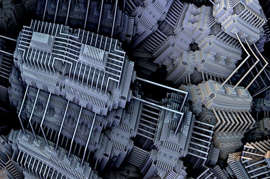
What kind of platform for quantum algorithms have Russian scientists developed? Scientists have developed and launched a cloud-based software platform for developers of quantum and hybrid quantum-classical algorithms. AiF.ru figured out why it was needed.
Center for Quantum Technologies, Faculty of Physics, Moscow State University MV Lomonosov Moscow State University has developed and launched a cloud software platform for developers of quantum and hybrid quantum-classical algorithms. This was reported by the media center of the National Technology Initiative. This platform allows you to run and test various programs designed to work with quantum computers.
Remote quantum computer
The platform allows you to implement and test almost any quantum and hybrid quantum-classical algorithms.
The platform will be of interest primarily to students, scientists and employees of research departments of companies engaged in quantum computing, quantum informatics, and quantum programming.
Until now, such platforms have been available only in foreign projects, for example, such as IBM Quantum Experience, D-Wave and a number of others. However, now, when special importance is attached to import substitution in high-tech areas, it is important to have a domestic solution that will make it possible to test quantum algorithms. The proposed platform meets this requirement. All data used during work is stored on servers located on the territory of the Russian Federation.
How to join?
To gain access, you need to register at the rcp.qotlabs.org website. After approval, the user will have access to computing resources and APIs for communicating with a quantum computing device or its classic simulator.
The physical basis for the system is two platforms developed at the Center for Quantum Technologies of Moscow State University: a quantum processor based on neutral atoms in optical traps and a linear-optical quantum computer. At the moment, classical simulators of quantum processors are available to users, in the near future it will be possible to get access to a real optical chip.
Stanislav Straupe, Head of the Quantum Computing Sector at the Center for Quantum Technologies, Moscow State University:
“Creation of such a platform is a large independent task. The development and testing of quantum computing algorithms is necessary so that in the future, with the development of quantum computers, it would be possible to solve more and more complex problems of both scientific and applied nature. “

